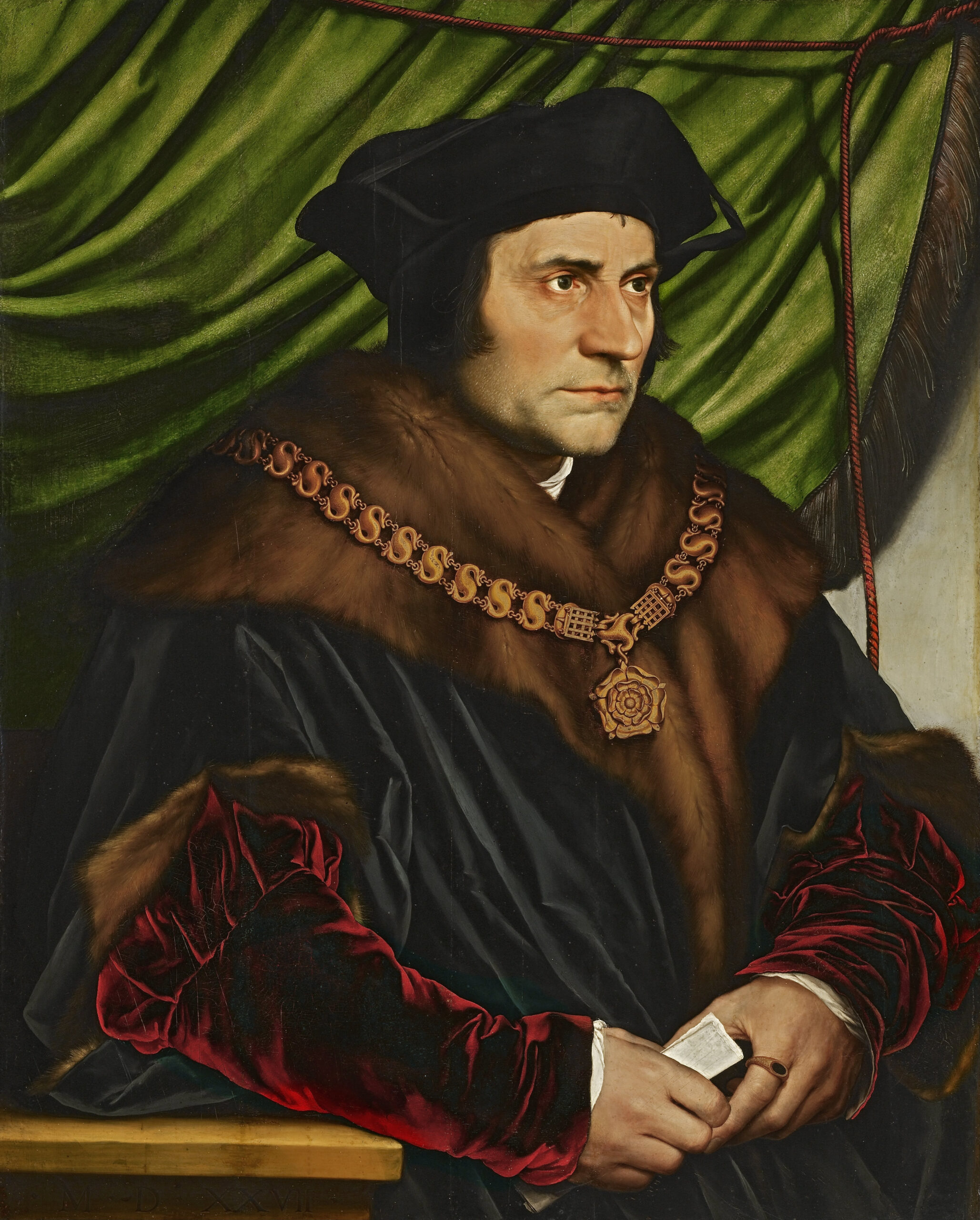
St Thomas More
Thomas More was born on 7 February 1478 in London, the son of a successful lawyer. As a boy, More spent some time in the household of John Morton, Archbishop of Canterbury. Later he studied at Oxford, where he qualified as a lawyer, although here he also contemplated the monastic life and lived for a time with the Carthusians. From 1510 to 1518 he was one of the two under-sheriffs of London and in 1517 entered the king’s service, becoming one of Henry VIII’s most effective and trusted civil servants and acting as his secretary, interpreter, speech-writer, chief diplomat, advisor and confidant. In 1521 he was knighted, in 1523 he became the speaker of the House of Commons and in 1525 chancellor of the Duchy of Lancaster.
At the same time More was building a reputation as a scholar. He was close to the radical Catholic theologian Erasmus, but wrote polemics against Martin Luther and the Protestant Reformation. Around 1515 he wrote ‘The History of Richard III’ which established that king’s reputation as a tyrant and has been described as the first masterpiece of English historiography; and in 1516 published his most important work ‘Utopia’ – a description of an imaginary republic ruled by reason and intended to contrast with the strife-ridden reality of contemporary European politics. More remained a passionate defender of Catholic orthodoxy – writing pamphlets against heresy, banning unorthodox books, and even taking responsibility when Chancellor for the interrogation of heretics.
As his political career flourished, Thomas looked for a new house for himself and his family. In 1524 he purchased 27 acres of land in Chelsea for £30, and 7 1/2 acres in Kensington for £20. It was here that he ordered the construction of ‘The Great House’, as it was known, for which he borrowed more than £700 from the King himself. Thanks to this financial assistance and the King’s energetic support, the house was built in a remarkably short space of time – it was begun in 1524 and finished in 1525. Hans Holbein (who was a guest at the house in the late 1520’s) described it as being ‘dignified without being ostentatious’. The gardens were a particular interest of More’s and were filled with a rich variety of flowering shrubs, herbs and trees (including the famous mulberry treeswhich Thomas is thought to have planted because of their Latin name – Morus).
More took the post of Lord Chancellor in 1529, just as Henry had become determined to obtain a divorce from Catherine of Aragon. When Henry declared himself ‘Supreme Head of the Church in England’ – thus establishing the Anglican Church and allowing him to end his marriage – More resigned the chancellorship. Although More had refused to take the oath declaring Henry to be supreme head of the Church, he used all his lawyer’s skills and tactics to avoid being found guilty of open treason. He knew that silence was his best defence. Thus he declined to discuss the supremacy nor would he criticise others who had sworn and signed. However, Henry could not afford even tacit dissent from such an important figure, who was respected and admired not only in England but across Europe. As Thomas Cromwell exclaims in “A Man for All Seasons”, “His silence is deafening all Europe”. More was therefore arrested and taken to the Tower of London.
More was brought to trial after fifteen months of imprisonment on July 1st 1535, and was convicted of treason on the basis of the false testimony of the Solicitor-General, Richard Rich, who claimed that while visiting More’s cell on June 12th 1535, More had explicitly denied Parliament’s authority to make Henry the supreme head of the Church in England. On 6 July 1535 More was executed on Tower Hill. His final words were: “I die the King’s good servant, but God’s first.”
On May 19th 1935 Thomas More was canonized by Pope Pius XI and on 31st October 2000 Pope John Paul II declared Thomas More the patron saint of statesmen/women and politicians.
St Thomas would surely have enjoyed the irony of the fact that almost 500 years after he gave his life to defend the Catholic faith in England, the site of ‘The Great House’ in Chelsea has now become a place where future Catholic priests receive their training. We, staff and students of Allen Hall, would like to gratefully express our debt to St Thomas and humbly ask for your prayers as we strive to be worthy witnesses to the faith which he gave his life to defend.